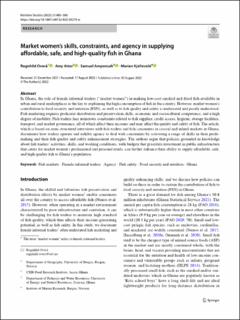| dc.contributor.author | Overå, Ragnhild | |
| dc.contributor.author | Atter, Amy | |
| dc.contributor.author | Amponsah, Samuel | |
| dc.contributor.author | Kjellevold, Marian | |
| dc.date.accessioned | 2023-01-11T11:20:05Z | |
| dc.date.available | 2023-01-11T11:20:05Z | |
| dc.date.created | 2022-12-05T16:25:50Z | |
| dc.date.issued | 2022 | |
| dc.identifier.citation | Maritime Studies. 2022, 21 485-500. | |
| dc.identifier.issn | 1872-7859 | |
| dc.identifier.uri | https://hdl.handle.net/11250/3042675 | |
| dc.description.abstract | In Ghana, the role of female informal traders (“market women”) in making low-cost smoked and dried fish available in urban and rural marketplaces is the key to explaining the high consumption of fish in the country. However, market women’s contribution to food security and nutrition (FSN), as well as to fish quality and safety is underrated and poorly understood. Fish marketing requires proficient distribution and preservation skills, economic and sociocultural competence, and a high degree of mobility. Fish traders face numerous constraints related to fish supplies, credit access, hygiene, storage facilities, transport, and market governance, all of which affect their incomes and may affect the quality and safety of fish. The article, which is based on semi-structured interviews with fish traders and fish consumers in coastal and inland markets in Ghana, documents how traders operate and exhibit agency to deal with constraints by activating a range of skills in their profitmaking and their fish quality and safety enhancement strategies. The authors argue that policies grounded in knowledge about fish traders’ activities, skills, and working conditions, with budgets that prioritize investment in public infrastructure that caters for market women’s professional and personal needs, can further enhance their ability to supply affordable, safe, and high-quality fish to Ghana’s population. | |
| dc.description.abstract | Market women’s skills, constraints, and agency in supplying affordable, safe, and high‑quality fish in Ghana | |
| dc.language.iso | eng | |
| dc.subject | Fisk | |
| dc.subject | Fish | |
| dc.subject | Kvinner | |
| dc.subject | Women | |
| dc.subject | Marked | |
| dc.subject | Market | |
| dc.subject | Ernæring | |
| dc.subject | Nutrition | |
| dc.subject | Ghana | |
| dc.subject | Ghana | |
| dc.subject | Matsikkerhet | |
| dc.subject | Food Security | |
| dc.subject | Agency | |
| dc.subject | Agency | |
| dc.title | Market women’s skills, constraints, and agency in supplying affordable, safe, and high‑quality fish in Ghana | |
| dc.title.alternative | Market women’s skills, constraints, and agency in supplying affordable, safe, and high‑quality fish in Ghana | |
| dc.type | Peer reviewed | |
| dc.type | Journal article | |
| dc.description.version | publishedVersion | |
| dc.subject.nsi | VDP::Samfunnsvitenskap: 200 | |
| dc.subject.nsi | VDP::Social sciences: 200 | |
| dc.subject.nsi | VDP::Samfunnsvitenskap: 200 | |
| dc.subject.nsi | VDP::Social sciences: 200 | |
| dc.subject.nsi | VDP::Samfunnsvitenskap: 200 | |
| dc.subject.nsi | VDP::Social sciences: 200 | |
| dc.subject.nsi | VDP::Samfunnsvitenskap: 200 | |
| dc.subject.nsi | VDP::Social sciences: 200 | |
| dc.source.pagenumber | 485-500 | |
| dc.source.volume | 21 | |
| dc.source.journal | Maritime Studies | |
| dc.identifier.doi | 10.1007/s40152-022-00279-w | |
| dc.identifier.cristin | 2089011 | |
| dc.relation.project | Norges forskningsråd: 290451 | |
| cristin.ispublished | true | |
| cristin.fulltext | original | |
| cristin.qualitycode | 1 | |
